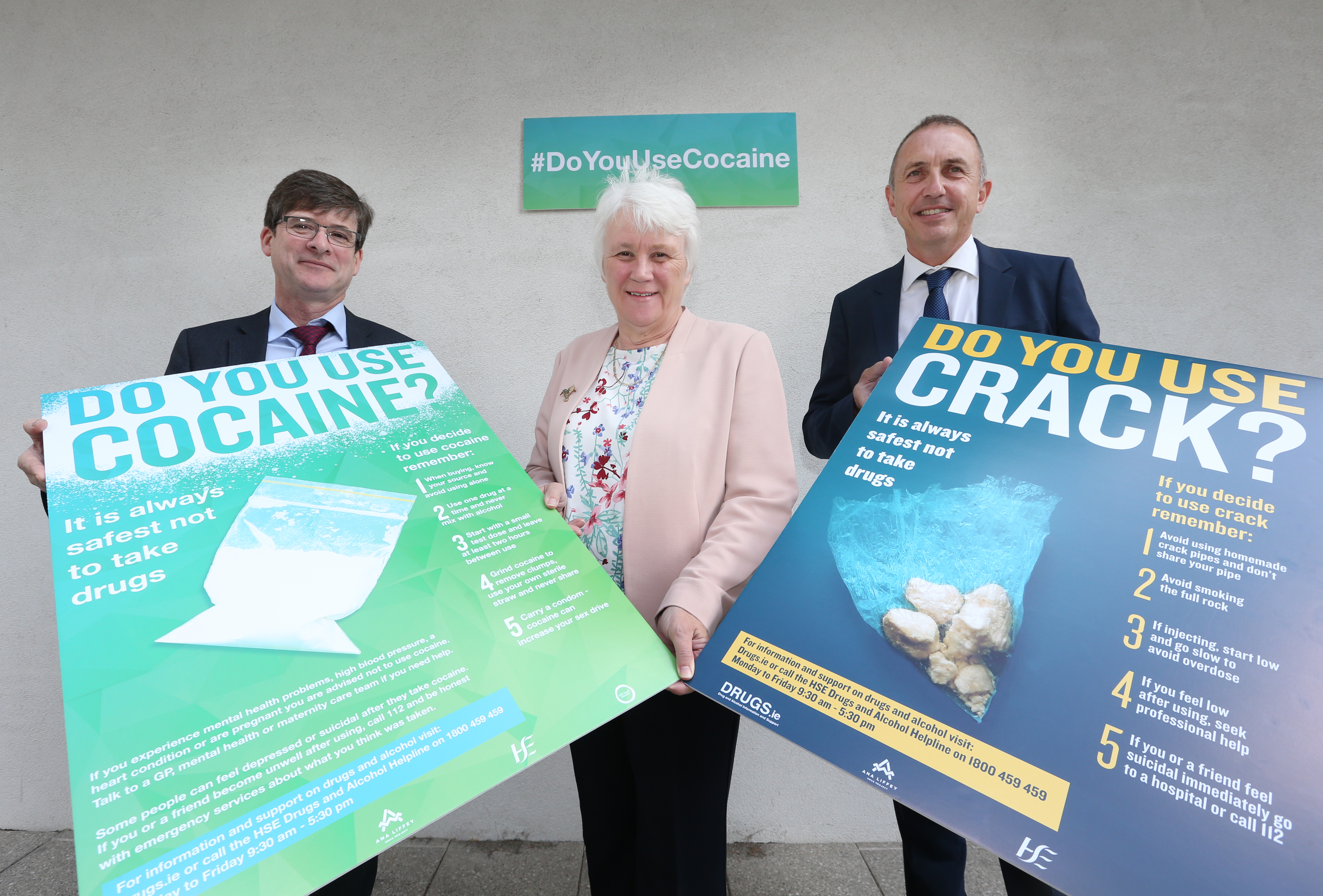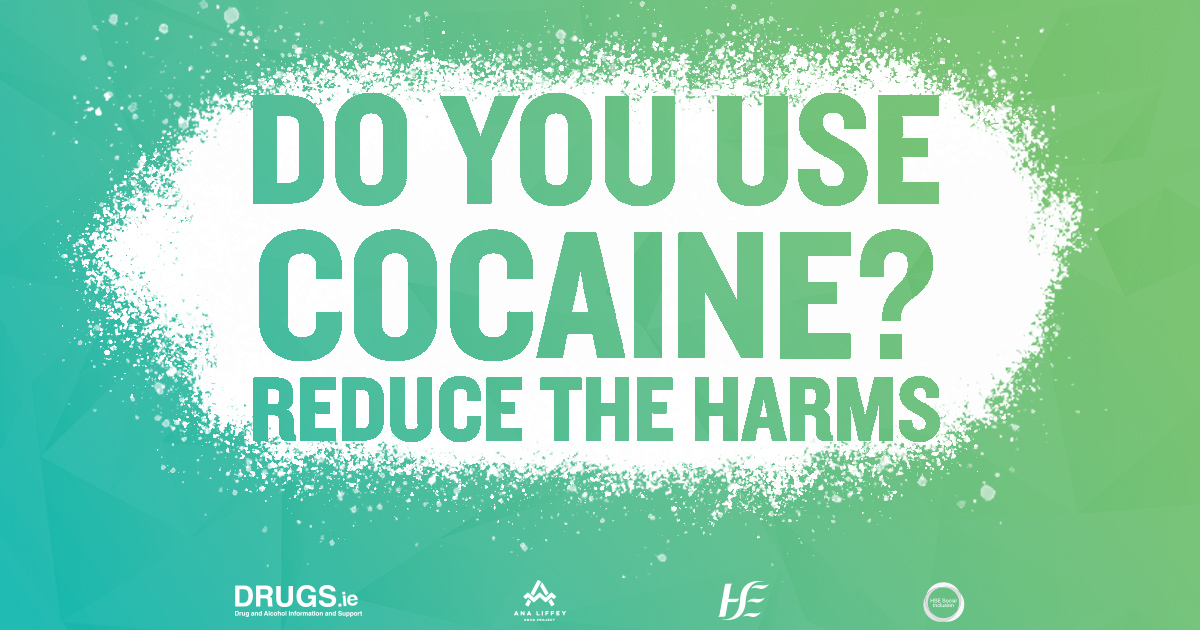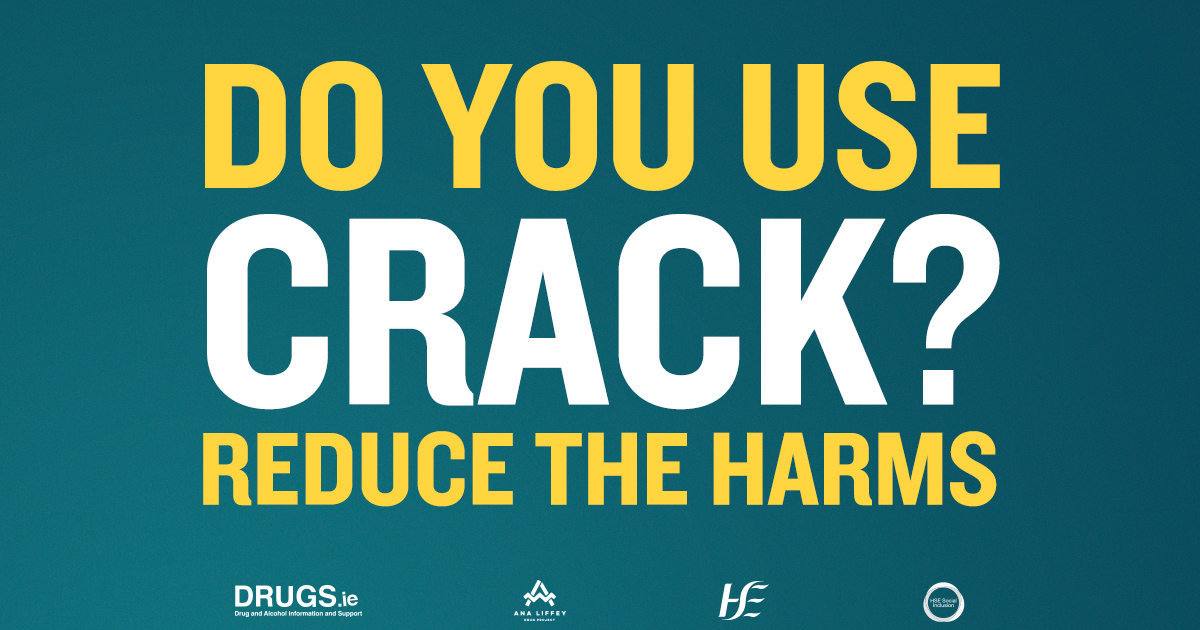Cocaine
Cocaine – Reduce the Harms
#DoYouUseCocaine
In response to an increase in the use of cocaine powder and crack in Ireland, the Ana Liffey have partnered with the HSE Office of Social Inclusion to produce information and harm reduction resources for people who use drugs and healthcare professionals.
Download the Cocaine factsheet
What is cocaine/crack?
Cocaine is an addictive, stimulant drug which can make people feel more alert, energetic and confident.
Crack is a form of cocaine made by chemically altering cocaine powder to form ‘crystals’ or ‘rocks’ which can be heated to produce vapours that are inhaled.
The effects wear off quickly, promoting the person using to repeat the dose in a binge type pattern that can increase the risks to health.
Crack has a more intense and immediate effect because it is delivered to the brain
much faster than cocaine powder with effects much stronger.
Administration
Snorting: Cocaine is most commonly sold as a fine white powder which is snorted. It
can be ground down until the powder is very fine, divided into lines and snorted by using a straw/tooter.
Dabbing “gumming”: Cocaine powder can be consumed by rubbing it onto the gums or by leaving it under the tongue. It is less commonly consumed in drinks or by swallowing orally.
Smoking/piping: Crack is most commonly smoked through a pipe. Using homemade
pipes created from tin cans and water bottles is not recommended. People are advised to contact local addiction services to access approved pipes, if available.
Injecting: Cocaine/crack can be dissolved in water and injected. Among certain user
groups, cocaine is sometimes injected in conjunction with heroin in what is known as a ‘speedball’.
Effects
Possible short-term effects
- Feeling alert, energetic, exhilarated and confident
- Heart rate can suddenly speed up and
- blood pressure could increase
- Raised body temperature
- Restlessness
- Hyperactivity
- Dilated pupils
- Dry mouth
- Sweating
- Nausea
- Loss of appetite
- Increased sex drive
- Paranoia and irritability
- A crash/come down with possible suicidal thoughts
Possible long-term effects
- Constriction of blood vessels which can interrupt blood flow to the respiratory and gastrointestinal systems
- Cardiovascular damage
- Stroke
- Insomnia, exhaustion and inability to relax
- Marked changes in mood and behaviour
- Loss of appetite
- Feeling aggressive/ becoming violent
- Anxiety and feeling depressed with
- possible suicidal thoughts
- Paranoia and hallucinations
- Damage to nose tissue
- Kidney and liver problems
- Possible loss of sex drive if used long-term
- Injecting may cause abscesses
- Weight loss
- Financial issues/drug-related debt
- Dependence
Reduce the harms
It is always safest not to take unknown or illicit drugs at all if a person chooses to take cocaine/crack they are urged to follow the following harm-reduction advice:
If you decide to use cocaine, remember:
- When buying, know your source and avoid using alone
- Use one drug at a time and never mix with alcohol
- Start with a small test dose and leave at least 2 hours between use
- Grind cocaine to remove clumps, use your own sterile straw and never share
- Carry a condom – cocaine can increase your sex drive
If you decide to use crack, remember:
- Avoid using homemade crack pipes and don’t share your pipe
- Avoid smoking the full rock
- If injecting, start low and go slow to avoid overdose
- If you feel low after using, seek professional help
- If you or a friend feels suicidal immediately go to a hospital or call 112
Think about your health - Avoid using if you are feeling low, experience mental health problems, high blood pressure, a heart condition or become pregnant.
Overdose
Cocaine can raise the body’s temperature, cause convulsions, a heart attack or heart
failure. It is possible for cocaine users to die from an overdose. With stimulant type drugs, the risk of overdose increases with the amount used.
The risk of overdosing is also increased if cocaine is mixed with other drugs or alcohol.
An overdose on cocaine is more likely if cocaine is injected.
Recognised consequences of cocaine overdose are:
- Restlessness
- Pressured speech
- Change in behaviour
- A sudden rise in body temperature - feeling very warm or having hot skin
- Flushed face
- Muscle cramps
- Stiffness in arms and legs
- Confusion
- Seizure
- Increased motor activity
- Hypertension – high blood pressure
- Tachycardia
- Irregular heart rhythm
- Stroke
- Heart attack
- Unresponsiveness
Cocaine/crack and alcohol
When cocaine and alcohol are used together they combine in the body to produce cocaethylene which increases risk of damaging organs such as the liver and heart. Cocaethylene is more toxic than cocaine and alcohol alone and produces a greater increase in heart rates and blood pressure. Cocaethylene prolongs the effects of cocaine and takes longer to leave the system than cocaine alone. When using both alcohol and cocaine in combination, people risk continuing to drink without realising how intoxicated they are.
Cocaethylene increases the risk of epilepsy, suicide, violence, accidents and sudden death.
Be aware of your use - Take breaks in between use to give yourself some time to recover. Consider talking to a professional if you are finding it difficult to stop using cocaine.
Concerned about your cocaine use?
Take the DUDIT Online Self-Assessment tool to identify the impact of your use.
Search for a local support service through the Drugs.ie National Directory of Drug and Alcohol Services drugs.ie/services
For information and support on drugs and alcohol visit Drugs.ie The HSE Drugs & Alcohol Helpline can be reached on 1800 459 459 Monday – Friday 9:30 – 5:30.
Campaign Press
The campaign was launched by the Minister of State for Health Catherine Byrne, in The Royal Hibernian Academy, Dublin on July 17th 2018.
The Irish Times: HSE issues ‘harm reduction’ guidelines on how to take cocaine
RTE.ie: Campaign aims to raise awareness of dangers of cocaine
Irish Independent: HSE launches harm reduction campaign to combat significant rise in use of crack cocaine
The Examiner: Ireland 4th highest in EU for cocaine use among young adults, new research shows
The Examiner: Cocaine users urged to take test dose, use sterile straws, and not share straws
The Journal.ie: HSE launches new advice campaign as cocaine use returns to Celtic Tiger levels
FM 104: More young adults are taking cocaine
Newstalk.ie: HSE says new cocaine awareness campaign will not encourage drug use
Joe.ie: HSE release tips on how users can reduce harms of cocaine and crack
Radio Nova: HSE Offer Advice On Growing Irish Cocaine Use

















